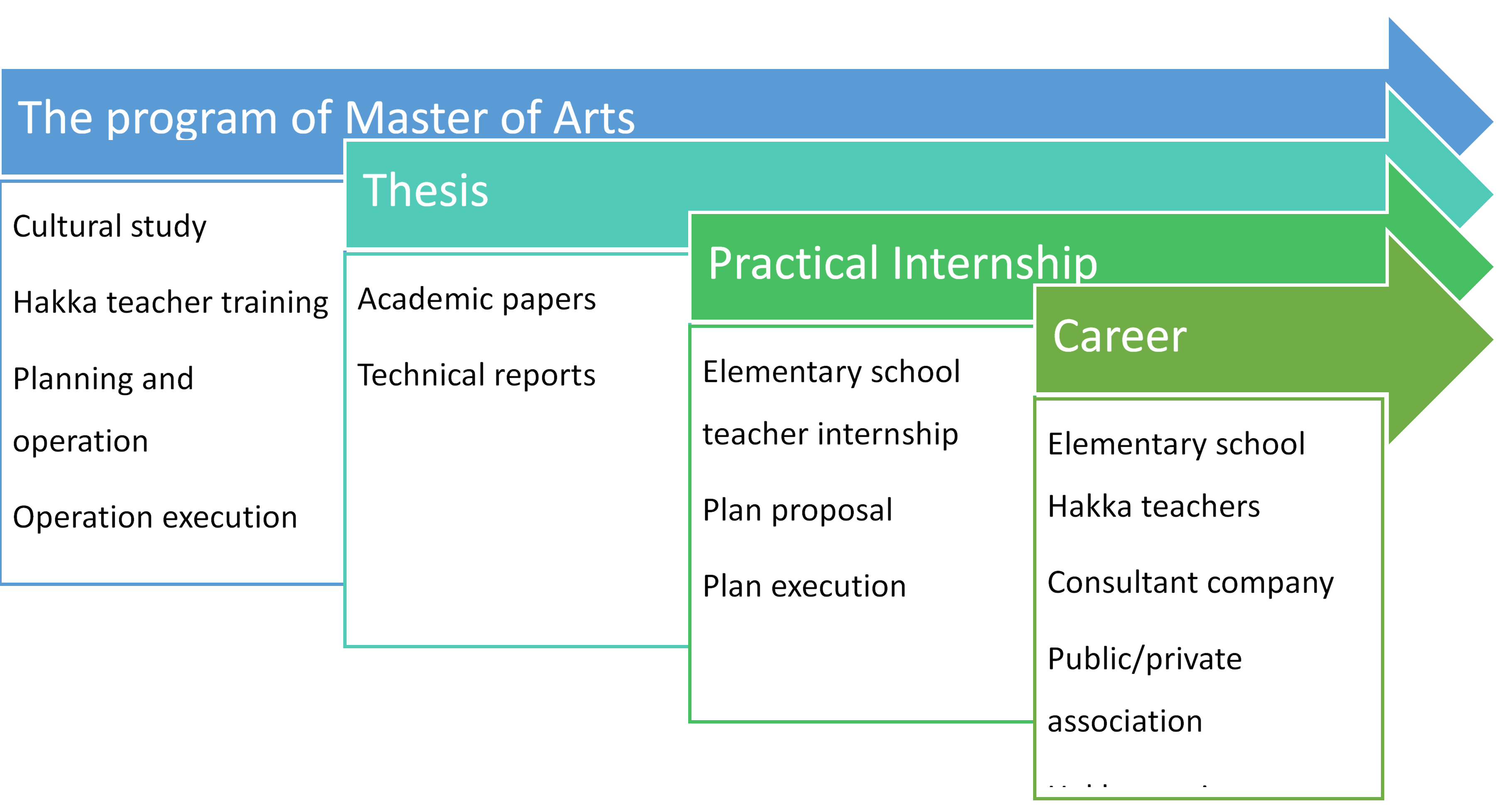Introduction of the program
1. The origin of the establishment
(1) Multicultural is the trend of the world academia
In 2001, UNESCO stated in the “Universal Declaration on Cultural Diversity” Article 1: “Cultural diversity to human beings is as important as biodiversity to nature.” The protection of cultural diversity is an ethical responsibility that needs to be implemented and is closely linked to respect for human dignity, and the extinction of ethnic languages is one of the key tasks.
The multicultural policy first appeared in Switzerland, and then spread to different countries such as Canada, the European Union, the United Kingdom, the United States, Australia, and New Zealand. It emphasizes that different cultures have their own uniqueness, which is especially important when it comes to accepting other peoples.
(2) Development of Taiwan Hakka Ethnicity
The ethnic groups in Taiwan mainly consist of the Han and aboriginal ethnic groups, and the Hakka is about 15% of the Han ethnic group. The Hakka Affair Council which established in June 2001 is the highest authority in the affairs of the Hakka community in Taiwan. Its goal is to revive the Hakka culture in Taiwan, and to build a society that respects diverse ethnic cultures in Taiwan.
According to the Hakka Basic Law, the Hakka Committee announced a total of 70 townships to be “Key Development Areas of Hakka Culture” on February 24, 2006. This policy aims to strengthen the Hakka language, and to promote culture and cultural industry development in these areas.
2. Cooperation with the middle and long-term development of the NPTU
(1) Introduction of the NPTU
NPTU was established by the merging of National Pingtung University of Education and the National Pingtung Institute of Commerce on August 1, 2014. After the integration, NPTU has become a mix of normal, managerial, computer science, technological, and higher education within one university in Pingtung County.
NPTU provides multiple learning channels for students to have the opportunity to take courses across different fields, and teachers' teaching and research standards are advanced, further enhances the university’s competitiveness and sustainable development.
(2) Mission and Vision of the NPTU
• Mission: Pursue excellence and ensure quality education and equal learning opportunity while enhancing teaching, researching, and learning resources in order to equip personnel with social values, build a sustainable and healthy environment, and dedicate ourselves to social progress.
• Vision: Diversification and confluence in preparing elite professionals who strive for excellence in their drive toward globalization.
(3) Middle and long-term development of the NPTU
The mission of the NPTU is to persistently strive for innovation and excellence, pursue national and international academic trends, and to combine industry and academia with Taiwan’s natural and social resources to develop a university with wide-ranging features that include business, management, information, education, humanities, and arts, to cultivate students with a view of global citizenship suitable for meeting the needs of society.
The USR (University Social Responsibility) plan adopts a "win-win-win" strategy based on the development of university professors’ research, the solution of social problems, and the application of what college students have learned. Through the connection with university courses, teachers and students can step out of the academic research framework. In this way, university professors, students, and local organizations are mutually beneficial, hoping to create innovative value in line with the development of the local industry, and jointly create a model for university students to participate in society and citizenship, and work hard for local development.
(4) Public associations cooperation mechanism
NPTU promotes the mechanism of substantive exchanges and cooperation by means of regional industry-university cooperation, fostering strategic alliances, and assisting corporate proposals. In recent years, NPTU has actively forged strategic alliances with industry, government, and academia with substantial relationships.
3. Program of Master of Arts in Hakka Cultural Industry
(1) Predecessor of this Program: The Graduate Institute of Hakka Culture and the Department of Taiwan Cultural Industries Management Hakka Group
In 2006, the university cooperated with the major policies to apply for a plan to increase faculty staff, and the Graduate Institute of Hakka Culture was approved for establishment. In 2010, the Graduate Institute of Hakka Culture and the Department of Taiwan Cultural Industries Management were integrated as the Department of Cultural Creative Industries (CCI).
Under the cultivation of the Hakka group in the CCI, the research on Hakka culture (and industry) has reached the standard of independent conduct. Therefore, the NPTU intends to separate the study of Hakka culture (and industry) and establish the Master of Arts in Hakka Cultural Industry Program. The advantage of setting up a program under the college is that in addition to the original faculty of the CCI and the Department of Chinese, the research of Hakka cultural industry will be supported by the whole college faculty.
(2) The development direction of the Program
The development direction of the program is mainly to supplement the lack of professionalism of the marketing, cultural and creative design, planning, and tourism and recreation services in the Hakka industry, so as to promote the Hakka agriculture industry transforming into the experience service industry.
Liudui Hakka settlements are located in the 12 Hakka villages in Kaohsiung City and Pingtung County. Many celebrities, politicians, business owners, and literary artists have been bred in this area, and the humanistic and artistic resources of the industry are very rich.
With the overall industrial transformation, the local cultural industry has gradually received attention. The regional revitalization strategy that emphasizes local characteristics has been promoted by various departments, and with public sector resources and private investments, Liudui's diverse humanities and traditional industries were combined to promote local industries to upgrade and flourish. However, due to the aging of local manpower, young professionals with new marketing, art design, technology and service skills are expected to return to their hometowns to serve in order to move towards the future together.





